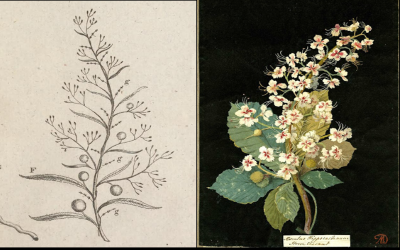The Affinities of Natural Objects: Observation and Analogy in Romantic Natural History

Visual Cultures Resource Centre (E361), John Medley East (Building 191), Parkville Campus, The University of Melbourne
MapAt this free public event, early career researcher Dr Alexandra Hankinson (The University of Melbourne) will present her unpublished book manuscript, 'The Affinities of Natural Objects: Observation, Analogy, and Ecology in Romantic Natural History' for dynamic peer review by Professor Theresa M. Kelley (University of Wisconsin-Madison), a leading authority on Romanticism, aesthetics, and the history and philosophy of the natural sciences. The discussion will be hosted by Professor Deirdre Coleman (The University of Melbourne) and questions and observations will be invited from audience members. Registration is not required.
Abstract: Taking a broad sweep across Enlightenment and Romantic literature and science, Dr Hankinson’s manuscript explores the role played by observation and analogy in the natural history of the long eighteenth century. In particular, her work considers the imaginative dimensions of scientific discovery, describing how eighteenth- and early nineteenth-century naturalists and literary writers such as William Bartram, Erasmus Darwin and Samuel Taylor Coleridge used analogical thinking to understand the biological relationships between plants and animals and to extend enquiry from living forms and processes with which they were familiar to those that were still unexplained.
Hankinson's work also draws attention to the doubleness of analogical reasoning, suggesting both how it could act as a source of far-reaching insight and an impediment to scientific progress. While the continual discovery of shared qualities, processes, and units of life enabled scientists to explain and clarify the non-human lives around them, it also prevented recognition of biological difference and discontinuity, eliding particulars and hindering acceptance of alternative configurations of organic relationship. These ideas are explored through chapters on colonial natural history, plant-animal similarities and differences, Linnaean taxonomy, the scientific poetry of Erasmus Darwin, interspecific interactions, and the movement from analogy towards evolution and ecology, all of which are currently of intense interest to Romantic scholars.
About the panel members:
Alexandra Hankinson is a Research Assistant for the Research Unit in Enlightenment, Romanticism, and Contemporary Culture (ERCC), Faculty of Arts, The University of Melbourne. Her research focuses on the literary and cultural history of biological thought and phenomena from the Enlightenment to the present. Her doctoral thesis explored the cross-section between figurative and scientific thought in the botany and zoology of the long eighteenth century, with emphasis given to the way in which observation and analogy came together in this period to uncover and explain the affinities of living objects. She has published on the poetic and scientific history of insect pollination in Romanticism (2018) and is currently working on an online exhibition for the Romantic Circles Gallery of Visual Culture on hybrid and interspecific relationships. Her present research interests include the co-functioning of art and science in the discovery and description of camouflage and mimicry; histories of biodiversity and ecology in Australia; field notes; imaginative and scientific responses to avian migration; and seasonality and harvest in Romantic art and literature.
Theresa M. Kelley is Marjorie and Lorin Tiefenthaler Professor of English Emerita at University of Wisconsin-Madison. She is the author of Clandestine Marriage: Botany and Romantic Culture (Johns Hopkins, 2012), Reinventing Allegory (Cambridge, 1997), and Wordsworth’s Revisionary Aesthetics (Cambridge, 1988). She has published widely on Romantic poetics, aesthetics, visual culture, the matter of archives, and philosophy. She is the recipient of fellowships awarded by the American Council of Learned Societies, Simon D. Guggenheim Foundation, National Endowment for the Humanities, Henry E. Huntington Library, Yale Center for British Art and UW-Madison Institute for Research in the Humanities. She is currently working on two books: Reading for the Future and Color Trouble.
Deirdre Coleman is Robert Wallace Chair of English, English and Theatre Studies, School of Culture and Communication, The University of Melbourne. She has published widely on the intersection of British Romantic literature with antislavery, natural history and colonialism. More recently she has been researching museum archives in Melbourne, Sydney and Queensland for an ARC-funded Linkage project with the Australian Museum on the economics of the 19th-century natural history trade. She is also exploring the social history of collecting in Australia, looking in particular at the diverse community which produced knowledge about the natural world from earliest settlement onwards. Starting with the correspondence networks and journal publications of members of the Victorian Field Naturalists Club (established in the early 1880s), she examines the motives and interests of bushmen, commercial specimen dealers, amateur collectors and (from 1900 onwards) an increasing number of salaried museum professionals. Cross-cultural exchange between indigenous people and fieldwork collectors on the colonial frontier, especially in far north Queensland and the Northern Territory, forms another part of this project, the aim of which is to achieve a wider understanding of Australia's natural heritage and environmental history.